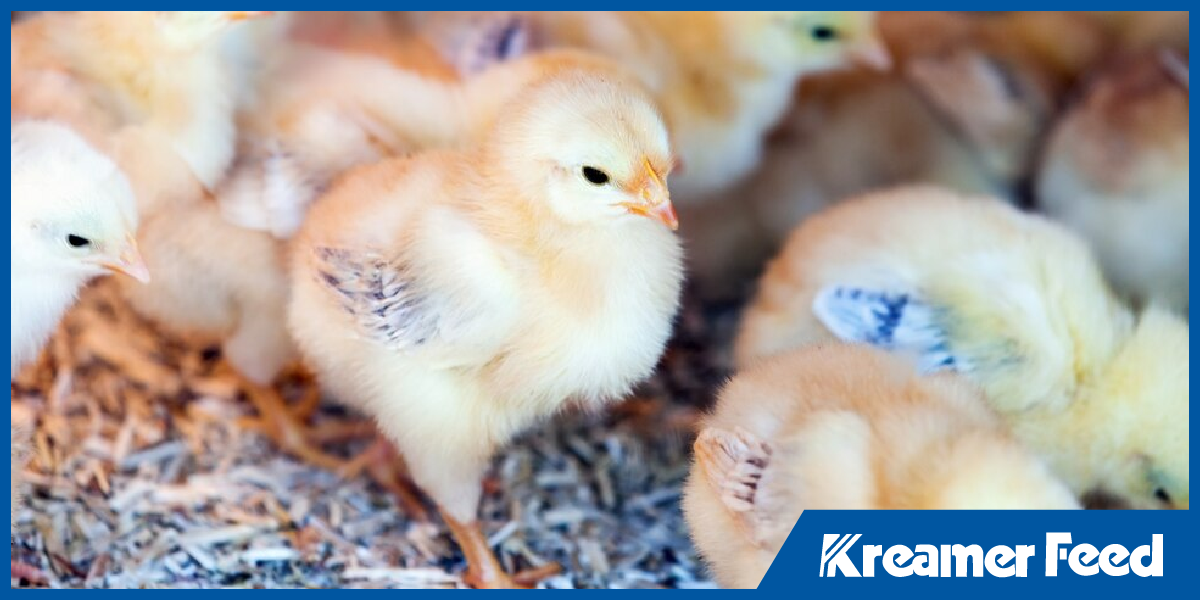
Spring is an exciting time for poultry farmers as new chicks hatch and flocks grow. Proper nutrition is essential during this critical stage of development, ensuring that chicks grow strong, healthy, and productive. Whether you’re raising backyard chickens or managing a farm, here’s what you need to know about feeding your chicks this Spring.
1. Start with High-Quality Chick Starter Feed
Newly hatched chicks require a nutritionally balanced chick starter feed to support rapid growth and strong development. Look for a high-protein chick feed with 18-20% protein to help with feather development and muscle growth. Organic and non-GMO chick feed options, like Kreamer Feed’s Nature’s Best Organic Chick Starter/Grower Crumbles, provide essential nutrients without artificial additives, giving your chicks the best start for healthy chick growth.
2. Medicated vs. Non-Medicated Chick Feed
When choosing what to feed chicks, consider whether to opt for medicated chick feed or non-medicated chick feed. Medicated chick feed, which contains amprolium, helps protect against coccidiosis, a common disease in young poultry. This option is ideal for chicks in high-risk environments.
On the other hand, non-medicated chick feed is perfect for chicks that have been vaccinated against coccidiosis or are raised in clean, controlled environments. For those looking for the best options, Blue Ribbon Non-GMO chick feed ensures a healthy chick nutrition guide with no artificial additives or preservatives.
3. Provide Grit for Digestion
As chicks begin to explore and eat solids, it’s important to provide grit for chicks to aid in digestion. Chicks need small grit to break down their feed in the gizzard, which helps with nutrient absorption. Make sure to offer grit if they are consuming anything other than formulated feed, like high-protein chick feed or grains.
4. Fresh, Clean Water is Essential
Hydration is just as important as nutrition when it comes to feeding chicks in Spring. Ensure your chicks have access to clean, fresh water at all times. Use a chick waterer to prevent spills and contamination. Avoid deep containers to prevent drowning. Water plays a crucial role in digestion and overall healthy chick growth.
5. Transitioning to Grower Feed
At around 6-8 weeks, it’s time to transition your chicks from chick starter feed to a chick grower feed. The protein content in grower feed is slightly lower (15-18%) to support steady growth without promoting excessive weight gain. The chick grower feed transition is essential for maintaining long-term health and productivity.
6. Monitor for Health and Growth
As you continue feeding your chicks, regularly monitor their health. Look out for signs of slow growth, feather loss, or lethargy, which may indicate nutritional deficiencies or health issues. Ensuring proper chick nutrition from the start can prevent these issues. If you notice any concerns, adjust the chick feeding schedule or consult a poultry expert.
Set Your Chicks Up for a Healthy, Thriving Future
By providing the right organic chick starter feed or non-GMO chick feed, and offering proper hydration and care, you can ensure your chicks grow into healthy, productive chickens. Following a proper chick feeding schedule and focusing on healthy chick growth will help set the foundation for a thriving flock.
For premium organic chick starter feed or non-GMO chick feed, trust Kreamer Feed’s Nature’s Best Organic Feeds and Blue Ribbon Non-GMO chick feed—trusted by poultry farmers nationwide! Contact us today for more information on how to raise healthy chicks and ensure their long-term success.
For bagged feed, please visit any Tractor Supply store nationwide for a range of Nature’s Best Organic Feeds products to nourish and grow all of your poultry and livestock. These products are also available on TractorSupply.com! For bulk feed to stock your commercial operation, please call 570-374-8148.